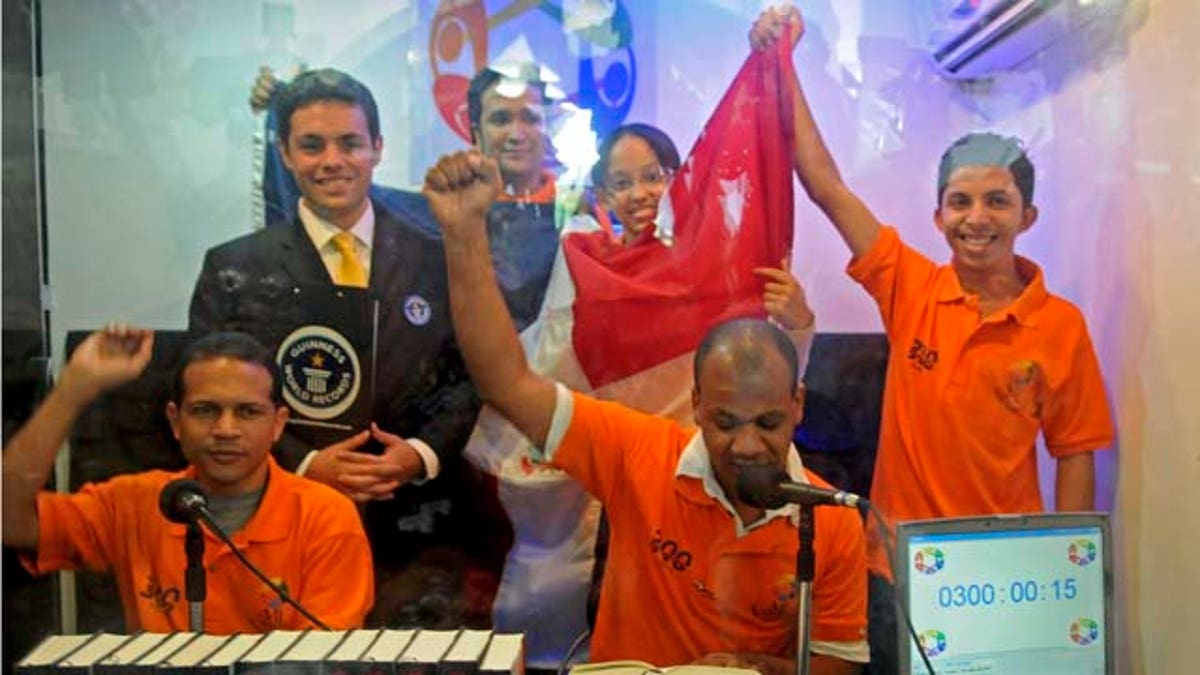
Michael Janela, second from left, judge of the Guinness World Records, poses with Dominican students, from left, Carlos Jose Reyes, Cristian Rodriguez, Martha Esther Madera, Randolfo Jimenez and Jose Manuel Bueno. (AP2011)
Read any good books lately? How about dozens and dozens of them?
Five students set a world record Wednesday after reading aloud for 300 straight hours to raise awareness about books in the Dominican Republic. And they kept going.
Guinness World Records recognized the university students for breaking the previous record of 240 hours set in 2009 by a group of women from Miami-Dade College.
"This is a very important case because it deals with reading and promotes intellectualism," said Michael Janela, a Guinness official who certified the record.
He called it a tremendous sacrifice.
- Jennifer Lopez’s New Reality Show is about a Towing Crew. Yeah, Towing.
- Bill to Abolish Visa Lottery Sent to Full House
- Marlen Esparza, Six Time USA Boxing Champ, Wants to Make History at 2012 Olympics
- ‘Knights Templar’ Drug Cartel Lives by Medieval Code
- Glamming Up Medical Bracelets
- Jennifer Lopez and Marc Anthony Through The Years
"There is no time to sleep, nor even to eat," he said. "Sometimes they are reading by themselves at dawn, without support."
In preparation for the bid, participants practiced reading up to three hours a day for two years, said Cristian Rodríguez, a 23-year-old communications student.
The students began reading July 7 at a library just northwest of the capital, taking turns before a microphone every two hours. They chose to read the complete works of historian and former Dominican President Juan Bosch. The project was being transmitted live on the Internet.
The students had planned to stop Wednesday but decided to extend the reading until early Saturday to complete 365 hours of reading, one hour for each day of the year.
Guinness officials will continue to monitor the reading to verify the final time.
"Dominicans stay up late for parties, stay up late for dancing and for drinking in the street, why can't they stay up late to support us?" said Carlos José Reyes, a 34-year-old librarian who organized the group in 2008 while brainstorming with a friend, Randolfo Jiménez, about how to entice more people to start reading.
Both Reyes and Jiménez are members of a local writing group and have published several poetry books.
Reyes hopes the new record will inspire young people to read at least one hour a day and encourage business owners to help update the selection of books in libraries across the Dominican Republic.
"A lot of times they only have obsolete, out-of-date books that do not fulfill students' expectations," he said.
Only 39 percent of primary schools in the Caribbean nation have a library, compared with 51 percent of primary schools across Latin America, according to statistics from the United Nations.
"We're going to make reading hip," said José Manuel Bueno, a 19-year-old philosophy student.
This story is based on the Associated Press reporting.
Follow us on twitter.com/foxnewslatino
Like us at facebook.com/foxnewslatino
